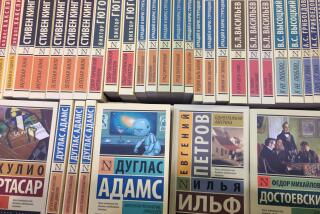Western Press and the Soviets
In his article (Editorial Pages, May 11), “Western Press, Government Smear Soviets,” Prof. Jerry Hough of Duke University tries to make the case that the U.S. government, the Western press, and even scholars studying Russian society are unfair to the Soviet Union. He says, for instance, that our own information policy toward the Soviet Union is “. . . closed and biased . . .” However, he tars with a broad brush, so the unfortunate reader gets no opportunity to verify the accusations made.
The “Western press,” the professor’s favorite whipping boy, is criticized for giving too much attention to anti-Soviet stories. Yet the Soviets themselves sometimes cause the problem, as in the case he cites in which deliberately falsified information (on infant mortality) was given by the Russians to the press. He also castigates the press for anti-Soviet bias in Chernobyl nuclear plant stories; but again the problem wasn’t the Western press. The press did its best to present views of American experts, who had to comment in spite of sparse data. True, because the Soviets withheld information, some of the commentators’ guesses were off the mark. But comments I heard were just as critical of the U.S. nuclear program as they were of the Russian.
The author says, “For diplomats based in Moscow, it is useful to smear the Soviet Union abroad,” but again the press does not escape unscathed: “Correspondents who report the embassy interpretation are . . . reporting the Administration line as objective analysis.” How informative it would be if the professor could tell us to whom he is referring. Of course the Administration will try to present all information in the most favorable light, just as all governments and public figures do. If he thinks he can change this aspect of human nature, he has a debate going with the Creator, and I certainly wish him luck.
The job of the press is to report what the government says (that’s news, and I want to hear it, whether I choose to believe it or not), and then of course go on to interpret and challenge. I believe the pluralistic Western press, which Hough so castigates, does challenge the government line. If he doubts it he should look at the Washington Post’s Watergate stories, or the N.Y. Times’ printing of the Pentagon Papers, or the Los Angeles Times’ relentless criticism of the President’s budget policies.
Even scholars (presumably excluding Hough) are not spared: the U.S. government “has enormous influence” on them because of a funding carrot. But what scholars? Pray tell us, since Hough himself seems to possess the wand of apodictical veracity, which of his colleagues are so venal as to bend the truth in quest of research grants.
The professor’s criticisms are pungent, and doubtless have some validity, but you won’t get any proof from his article. He cites no sources: not a spokesman, not a newspaper, not an article, not a scholar among all those who must be guilty. He charges “McCarthyism,” but if this pejorative term implies unsubstantiated accusations and polemic I think Hough has fallen into the very error of which he so shrilly accuses others.
MICHAEL STRIEBY
Chatsworth
More to Read
Sign up for Essential California
The most important California stories and recommendations in your inbox every morning.
You may occasionally receive promotional content from the Los Angeles Times.










